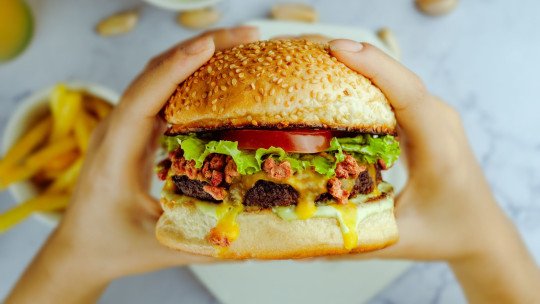
Has it ever happened to you that you were studying or working and you got up to snack on something every now and then? And was it because of real hunger, boredom or overwhelm? If you don’t know how to answer this last question, it’s understandable, they are difficult to distinguish.
And sometimes we eat not out of true hunger, but depending on our emotional state. This is not a problem in itself, we all have some moments when we eat out of emotional hunger.
However, if we do not distinguish these types of hunger, it can escalate, become a repetitive pattern and cause serious physical or mental problems. Therefore, in this article I will focus on describing what each type of hunger is and how to know if it is real or emotional hunger.
What is real hunger?
Real hunger is the physiological sensation that our body causes naturally when it perceives that it is lacking nutrients. It usually follows a cyclical pattern, since it depends on circadian rhythms.
This sensation is controlled by the brain, specifically by the hypothalamus, the control center for the basic functions of our body that keep us alive. Among other things, the hypothalamus monitors the levels of glucose, other types of nutrients and hormones in the blood, as well as the level of vacuum in the stomach and intestines.
When it perceives that there is a deficit, it sends a signal to the stomach to start producing ghrelin, the hunger hormone, which causes a series of physiological changes. Among these changes, for example, are the peristaltic movements of the stomach and intestine, which are responsible for making our stomachs rumble when we are hungry.
Therefore, Physical or real hunger are nothing more than signals that your body sends you so that you eat, give it energy and keep it in good condition. In this way, the hypothalamus maintains homeostasis, that is, the balance necessary for all vital functions to continue.

What is emotional hunger?
Emotional hunger, on the other hand, is not a sensation that arises from our basic needs to obtain nutrients. This sensation arises as a method to regulate an unpleasant emotion maintained over time, but it is not a feeling of real hunger, you do not need to eat. And what does hunger have to do with emotions then? There are certain foods that, due to their texture, flavor or nutrients, are especially pleasant for us to eat. They tend to be foods rich in fats and sugars, such as French fries, pizza, ice cream, hamburgers.
Eating this type of food gives us immediate well-being, which can momentarily compensate for the discomfort that causes us to feel unpleasant emotions, such as anxiety, sadness, guilt, boredom, etc. I’ll give you an example: the typical romantic plot scene in which the protagonist is eating a tub of ice cream, because she is sad after an argument/breakup with her romantic interest.
In this sense, people who tend to feel emotional hunger do so because at some point they used food as a way to manage or avoid their unpleasant emotions. However, Eating is not a good emotion regulation strategy, but rather an impulsive behavior. Instead of managing and facing unpleasant emotions, what is being done is trying to avoid them with a solution that is really brief.
Nothing negative happens if we do it a few times, we can all feel emotional hunger at some stressful moment. The problem, however, is when it is often used as an emotional regulation strategy, for now because it does not work in the long term. We try to fill a void or emotional discomfort through a binge or several snacks spread throughout a day. , because a single meal is not enough, it will never be enough.
These foods give immediate and brief pleasure, so they do not eliminate our unpleasant emotion indefinitely, much less solve the situation that causes us the emotion. In these cases, we eat more than what is needed and beyond what is satiated. It is not a psychological disorder as such, but it can be a symptom of emotional problems and psychological disorders, such as anxiety disorders, and especially eating disorders, such as binge eating disorder and bulimia. It also often causes physical health problems, such as obesity. And, above all, what is created is a bad relationship with food.

How to distinguish if it is real hunger or emotional hunger?
So that emotional hunger does not become a problem, the first step you can take is to learn to differentiate it from real hunger. In this way, instead of listening to emotional hunger, knowing that you don’t really need to eat, what you can do is put into practice other more functional emotional strategies. Below, I leave you a series of indicators that you can look at to know if it is real or emotional hunger.
1. Cause of hunger
The first thing you should do is analyze what was the trigger for hunger. How many hours have you been eating? Were you feeling bad when hunger struck? In the case of real hunger, its cause is simply the lack of food and nutrients in our body. As it is a cyclical natural process, it appears from time to time, when a while has passed since the last time we ate and it hits us again.
For its part, emotional hunger occurs in stressful, unpleasant, painful or boring situations. These cause the corresponding emotions in us, and that is when emotional hunger arises, when our body asks us to do something to not feel bad emotionally.
2. Physiological sensation of hunger
Real hunger appears little by little, and gradually increases in intensity, until we finally eat. During this progression, especially at the beginning, we can make rational decisions about what to eat and when, whether it is good for us now or we can postpone it (although if we have let a lot of time pass, hunger will be more intense and we will make more impulsive decisions).
Instead, emotional hunger arises suddenly, with high intensity from the beginning. This makes it difficult for us to avoid eating or postpone it, as if it were a real necessity (ironically).
3. What and how we eat
On the one hand, in the case of real hunger, we can decide what to eat calmly, since the body needs nutrients, but it does not care how to get them (beyond our own food tastes). This is influenced by the progressive growth of hunger, which gives us room to think about what is best for us.
On the other hand, Emotional hunger works through cravings, and it is difficult to get them out of our heads. This type of hunger offers us little variety to choose from, since it only seeks specific foods, with pleasant textures and flavors. As an accessory, when eating due to emotional hunger, we tend to eat eagerly, devouring the food quickly.
4. When we finish
Finally, real hunger disappears when we have eaten enough and feel full. The feeling of being satiated is the opposite of hunger physiologically speaking, so that we cannot be truly hungry if we are already satiated, and it also gives us well-being. Being satiated depends on the nutrient levels of the food and our physical and mental activity, so it can vary a little.
Antagonistically, emotional hunger is difficult to satisfy, and people eat more than is necessary. This feeling of anxiety to seek to fill an emotional void adds to the feeling of guilt that arises from the feeling of lack of control. So, Eating due to emotional hunger is not only a dysfunctional emotional regulation strategy, but it can also increase our emotional discomfort.









